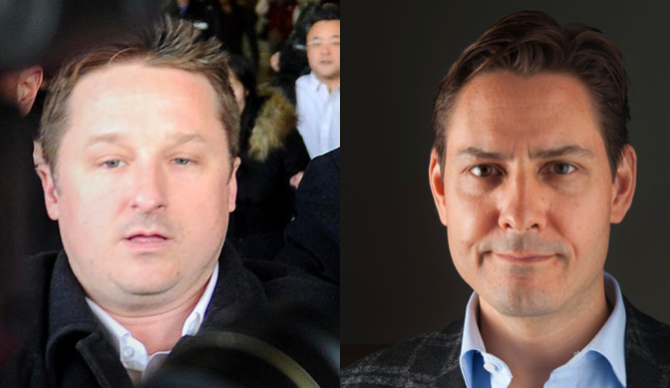
China has brought spying charges against two Canadians nearly six months after they were detained amid the Huawei row with the US and Canada.
Travel agent Michael Spavor and international crisis group analyst Michael Korvig have now been formally accused of “gathering state secrets” and “passing them onto foreign forces”.
The arrest of the two men followed the detention of Huawei executive Meng Wanzhou in Canada. It has been widely interpreted as a retaliatory move with the bid to attaining leverage.
The move also comes amid escalating trade tensions between China and the United States, with President Trump having issued an executive order banning American companies from buying and selling equipment made by the telecommunications firm.
Now, with the tensions rising and Meng’s extradition process ongoing, Beijing decided to up the stakes and lodge formal charges against the two on Thursday (May 16).
Chinese justice system
This does not bode well for them. The Chinese justice system is not like the West’s, not only because of its obvious political inclinations but also for the fact that Chinese courts do not share the same legal norms or procedural behaviours as their western counterparts, even for the pettiest of crimes, rendering guilty verdicts a certainty.
As this plays out, the arrests themselves constitute a strategy of indirect attrition warfare against America by punishing allied states that are deemed to follow suit too closely. This means that their fates are ultimately tied to what Canada does next, and it might not be good news.
In China, the legal system is an extended instrument of political governance. Marxist-Leninist institutions do not share the conceptualisation of law as an independent notion within its own right, but ultimately as a means of furthering political objectives from the centre and facilitating revolutionary change.
This means as much as Beijing has re-emphasised “rule of law” rhetoric as a component of its development, there is no space or means available to formally exclude the law from matters of politics. The legal system itself is consequentially a sub-component of the Communist Party order.
Given this, there is nothing within China’s court system that offer the two parties any solace or space to prove their innocence. Driven by politics, China’s courts behave in a fashion which are mechanised and routine, rather than investigative and impartial.
Judges are required to be members of the communist party. Their career incentives do not stem from following or interpreting legal principles, but instead following the orders of their superiors within an established hierarchy. This makes courts operate in a routine and mechanised function, rather than the “Innocent vs. guilty” format of the west.
Even if suspects are allowed to be represented by a lawyer, this does not affect the outcome, not least when pre-determined political stakes have been attached to it. Given this, trials in China are almost procedural and virtually all cases end with a guilty verdict.
Huawei decision crucial to their fate
This means that Michael Korvig and Michael Spavor’s fates are set up to be a foregone conclusion unless the broader geopolitical context changes. A lot of this hinges upon how Canada handles the extradition case of Huawei executive Meng.
If she is extradited to face trial in the United States, they are likely to be imprisoned for life. If Ottawa does not go through with it, then they may will be pardoned or given lesser sentences. But it is not the only consideration. With Trump escalating the stakes against China, not least pertaining to Huawei, China will be watching what Canada does on that note.
Why so? Because China’s political strategy amounts not to confronting America directly, but instead being assertive towards its closest allies with the goal of punishing them for following Washington too closely.
Rather than pursuing confrontation with the United States, it wants instead to isolate it and diminish broader support for it. Thus to do so, it is prepared to impose severe costs on Canada if it follows suit with Trump’s will. With the context deteriorating, this means that Canada has to make some big diplomatic decisions.
As the above notes, the lives and futures of these men are being bartered. It may be as brutal as a choice to following through with the White House’s demands or unwillingly consigning both Michaels to a lifetime detention in Beijing.
Follow our Facebook page for daily news updates
…
